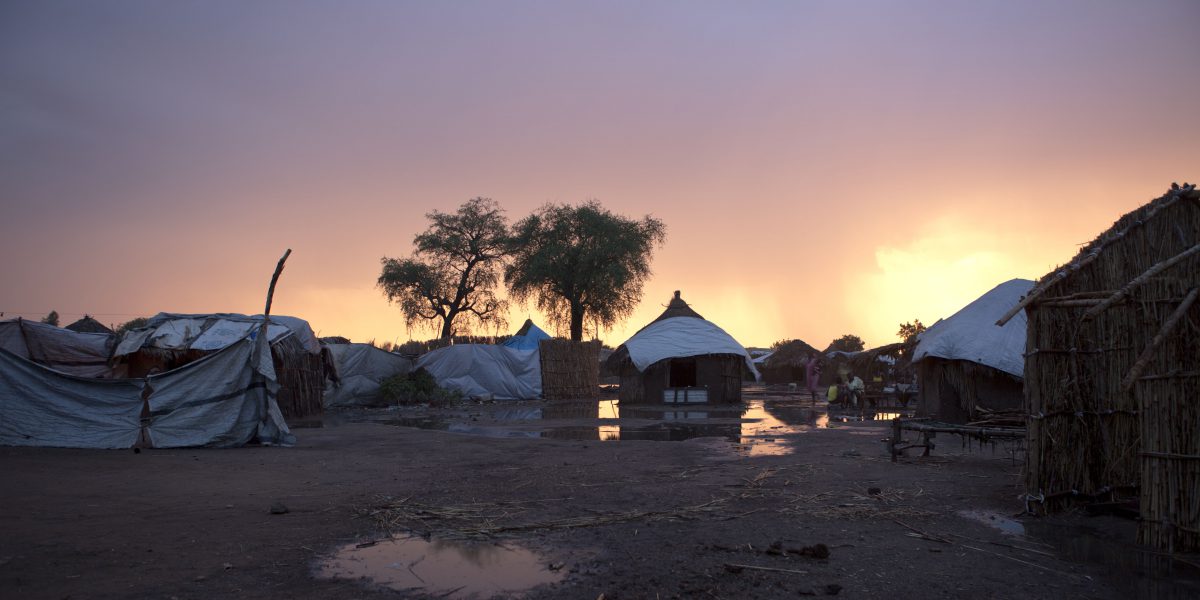Taste and See the Goodness of the Lord
17 April 2019|Matt Ippel, S.J., is a Jesuit-in-Formation of the USA Midwest Province

“That khawaja, he’s the pilot.” I overheard these words returning to the Jesuit Refugee Service (JRS) center with Stephen, a refugee who helps provide psychosocial services. As we walked, Stephen chuckled, translating the phrase: khawaja means foreigner. Many humanitarian workers are foreigners who come and go, like pilots and their planes.
In Maban, South Sudan, home to 150,000 refugees spread across four refugee camps, the temptation of piloting in and out is real. The transformative work JRS does is a small piece of a larger, complicated puzzle. And, the heat can be overwhelming. Being separated from close friends and comfort foods can be isolating. Hearing stories of suffering and abandonment is heartbreaking. Plus, the violence and high levels of insecurity are threatening. So, yes, there are moments I wish to be a pilot.
When the reality of the crucified Christ is ever more poignant, we can experience the temptation to pilot in and out, never truly being fully present. Maybe even the temptation to avoid or ignore the harsh and violent reality that so many of our sisters and brothers live with daily.
“Taste and see the goodness of the Lord”, exclaims the Psalmist. Amid the temptations that I encounter daily to pilot out, and the heartbreaking reality that the majority of people endure, how can I “taste and see” God’s active and transformative presence in the world? The answer is simple. Jesus did not flee from the world and her painful realities. Jesus did not pilot out; he landed the plane and remained grounded, he stayed with us.
We too are called to “go and do likewise,” to explicitly stand with the poor and persecuted, the refugee and the asylum seeker, to ignite justice and love. In remaining with the Sudanese refugees in Maban, I taste the hunger for learning opportunities among the refugees. I see the challenges of being a parent of a child with disabilities while living in a refugee camp with limited resources. And so too, I hear the laments of women when a young boy dies of malaria. I feel the compassion that refugees offer the vulnerable elderly and disabled people during the home visits. I bear witness to the deep accompaniment that refugees offer each other in support groups and counseling sessions. In staying here, I can attest to the active presence of the God of Life working through all of us to be beacons of light and hope in a seemingly forsaken place.
During Lent, we are offered a unique time and space to delve more deeply into the Christian mystery where love, not death, has the final word. And the Lenten practices – pray, fast and give – ground us in the present with our sight on the crucified peoples, resisting the temptation to pilot out and, instead, ushering us taste and see the heart of reality. Amid the crosses and crucifixions, we have chosen to orient our lives and vocations towards hope and resurrection.
Matt Ippel, S.J., is a Jesuit-in-Formation of the USA Midwest Province and is currently working with Jesuit Refugee Service (JRS) in Maban, South Sudan, after spending the last few years in Latin America.
This reflection is part JRS/USA’s Lenten campaign to #PrayFastGive4Refugees. we’re asking our supporters and friends to consider the Three Pillars of Lenten Observance – prayer, fasting, and almsgiving – as three calls to action for refugees. These three actions, like the mission of Jesuit Refugee Service – accompany, advocate, serve – are ways in which we can dedicate ourselves to our displaced brothers and sisters around the world. Click here to learn more.



